Glaucoma is defined as a progressive disease that affects the eye, damaging its optic nerve and is most of the time caused by additional eye pressure (intraocular pressure). Known as the “silent thief of sight,” glaucoma often has no early warning signs and is able to develop without treatment, leading to irreversible vision impairment. Understanding the eye’s optic nerve and the associated risk factors is crucial in preventing the need for treatment.
Table of Contents |
What Is the Main Cause of Glaucoma?
The disease is a leading cause of irreversible vision loss. The main cause of glaucoma is the transparent part in the front of the eye, which becomes cloudy, leading to more serious complications.
Untreated glaucoma is the most unnecessary form of blindness in the world today. While the condition can occur in anyone, an increasing prevalence rate is seen in those 40 and older, with a family history of the disease, or those who have diabetes. Glaucoma is most prevalent in developing and underdeveloped countries. Improved levels of healthcare access and awareness in the United States help those in need, and result in that lost vision can be controlled or avoided.
Glaucoma of the Eye: Types and Explanation
In layman’s terms, it pertains to a specific category of eye disease where there is damage and injury to the optic nerve due to the presence of abnormal and excessive eye pressure. This nerve is responsible for sending visual stimuli from the eye to the brain. Its impairment, therefore, would cause blind spots and eventual blindness.
These certain types of glaucoma include:
- Open-Angle Glaucoma – This is the most common type. In this case, there is a gradual clogging of the drainage canals leading to a slow accumulation of pressure.
- Angle-Closure Glaucoma – This is the opposite of the former in the sense that it is more uncommon but in this case, the drainage is abruptly blocked which causes a sudden surge in pressure.
- Normal- Tension Glaucoma – In this condition, the optic nerve does sustain damage and injury but there is no pressure, the reason for this is very poorly understood.
- Secondary Glaucoma – This is also referred to as glaucoma that is attributable to an eye condition, injury, and certain types of medication.
Glaucoma Causes: What Increases the Risk?
When trying to identify the glaucoma causes, things are complicated. There is no one size fits all explanation. There are various factors that come into play that makes things complicated.
- Increased intraocular pressure – This is said to be caused by the fact that there is an excessive and abnormal build up of fluids in the eye due to the fact that the aqueous humor is unable to drain.
- Genetics – This can also very well run in families. In this case, having a family history of the disease makes a person more susceptible to the disease
- Age - Those who are 40 or older are at a higher risk.
- Chronic medical conditions - Diabetes, hypertensive issues, and cardiovascular diseases can increase one's risk.
- Ocular trauma - It can lead to secondary glaucoma.
- Prolonged administration of corticosteroid drugs - It is known to increase ocular pressure.
Symptoms of Glaucoma: Early & Advanced Signs
In the early stages, glaucoma rarely shows any symptoms so it is important to have routine eye examinations. However, as the condition advances, the following symptoms of glaucoma may become evident:
- Decreased peripheral vision
- In advanced stages, there is tunnel vision
- Blurred vision or seeing halos
- Pain in the eyes (in angle-closure glaucoma, the pain is excruciating)
- Migraine with nausea (in cases of acute glaucoma attacks)
- Sudden vision with redness of the eye.
The symptoms of glaucoma usually go unrecognised and only get detected after a lot of damage has been inflicted, which is why it is important to get routine eye examinations, especially for people who are most vulnerable.
Can Glaucoma Lead to Blindness?
Glaucoma can indeed lead to blindness, which is why diagnosing it early is very important. Open-angle glaucoma is less severe- it progresses slowly, so it is easier to manage. One of the leading causes of blindness, which is irreversible blindness, is glaucoma; there is a possibility that glaucoma treatment can prevent complete vision loss.
- Open-angle glaucoma has the best prognosis as it progresses slowly.*Failure to treat angle-closure glaucoma can lead to vision damage so severe it can cause loss of sight.*
This is why it is important to focus on preventative measures and consult with glaucoma doctors in Gurgaon like Dr. Digvijay Singh.
How Is Glaucoma Diagnosed?
To diagnose glaucoma, optometrists and ophthalmologists perform numerous tests, which include:
- Gonioscopy: Assesses the angle of the eye where the iris and cornea meet.
- Tonometry: Measures the pressure inside the eye.
- Perimetry: Allows detection of blind spots in the vision using a special procedure.
- Pachymetry: Assesses the thickness of the cornea, which is vital in calculating Intraocular pressure.
- Optical Coherence Tomography (OCT of the Nerve Head): Assesses the optic nerve.
Suspecting the type of glaucoma helps doctors formulate a particular glaucoma treatment approach.
Glaucoma Treatment Options: Medications, Laser & Surgery
There is no absolute cure, but glaucoma treatment is designed to minimise the eye pressure in the glaucoma eye and save the vision that has not been lost. There are a number of approaches that can achieve this:
1. Medications
- Glaucoma eye drops, which either decrease the amount of fluid in the eye or increase the drainage.
- Oral pressure-lowering medications, which may be necessary in very high glaucoma pressures.
2. Surgical Procedures
- Laser trabeculoplasty: Improves drainage of fluid in open-angle glaucoma.
- Iridotomy with Laser: Surgically creates an opening in the iris in closed-angle (or angle-closure) glaucoma.
- Cyclophotocoagulation: Treats part of the eye that controls fluid production and reduces the amount of fluid in the eye.
3. Surgery
- Trabeculectomy. During this procedure, the eye is operated on to create a channel for drainage to relieve the pressure
- Drainage Implants. Small implants that assist in the drainage of the eye.
- Minimally Invasive Glaucoma Surgery (MIGS). Glaucoma surgery through new methods with less healing time.
A customised treatment plan by Dr. Digvijay Singh, an glaucoma specialist in Gurgaon, for the particular type and level of glaucoma is critical.
How to Prevent Glaucoma? Effective Prevention Tips
Although it cannot be completely avoided, people often wonder how to prevent glaucoma. This is valuable information to really slow down the disease.
Preventive Measures:
- Regular eye exams. Every new year is a new opportunity to catch a degenerative eye disease it is always best to be alert.
- Regular exercise. This works to decrease eye pressure.
- Eye protection. Use of other personal protective equipment to prevent injuries.
- Optimising health conditions. Autonomic conditions such as diabetes and high blood pressure should be controlled.
- Follow the recommended treatments. Treatment, such as prescribed and attended medications with a healthy lifestyle, should be taken seriously.
- Proper nutrition. Healthy meal plans should include antioxidants, leafy veggies or greens and omega-3 fatty acids.
All these healthier life choices should let you answer how to prevent glaucoma as yes, you can.
Lifestyle Tips for Glaucoma Patients
- Take prescribed medications on time.
- Avoid smoking and excessive caffeine, which may increase eye pressure.
- Limit screen time to reduce eye strain.
- Practice relaxation techniques like yoga and meditation to manage stress.
- Keep follow-up appointments with your ophthalmologist.
Why Should You Consult With a Glaucoma Specialist?
To ensure proper care, it is important to visit and verify the accompanying qualifications of an expert. Dr. Digvijay Singh, a prominent glaucoma specialist in Gurgaon, utilises state-of-the-art diagnostic equipment, offers individualised care, and develops a plan for ongoing maintenance. Combined with his pediatric ophthalmology and glaucoma expertise, eye care is available for all ages.
Also Read: Everything You Need to Know about Neuro-Ophthalmology
Conclusion: Managing Glaucoma With Early Detection & Treatment
Even with the negative connotation, glaucoma is an eye condition that is serious but manageable. Learning about glaucoma, the symptoms accompanying it, and even the causes leads to better detection. Glaucoma is a condition that is untreated and can proceed quietly and resulting in vision loss and even blindness. However, timely glaucoma treatment, routine eye check-ups and several key lifestyle changes can reduce risks.
Consult a reliable glaucoma specialist in Gurgaon, like Dr. Digvijay Singh, to receive proper treatment for glaucoma. By doing so, you will not only be able to have a better quality of life, but you will also be able to protect your eyesight.
FAQs: Common Question About Glaucoma
Q1. What is the first sign of glaucoma?
Ans. The first sign of glaucoma is often a gradual loss of peripheral (side) vision. Since early stages usually have no symptoms, regular eye exams are important for detection.
Q2. Can glaucoma be cured permanently?
Ans. No, glaucoma cannot be cured permanently. However, with timely treatment such as eye drops, laser therapy, or surgery, the disease can be managed, and vision loss can be slowed or prevented.
Q3. Who is at the highest risk of developing glaucoma?
Ans. People over the age of 40, those with a family history of glaucoma, diabetics, individuals with high eye pressure, or people who have had eye injuries are at higher risk.
Q4. How is glaucoma diagnosed by doctors?
Ans. Doctors diagnose glaucoma through eye pressure tests (tonometry), visual field tests, OCT scans, gonioscopy, and corneal thickness measurements (pachymetry).
Q5. Can lifestyle changes help prevent glaucoma?
Ans. Yes. Regular exercise, healthy nutrition, controlling diabetes and blood pressure, avoiding smoking, and going for regular eye check-ups can lower the risk of glaucoma progression.
Q6. Can glaucoma lead to total blindness?
Ans. Yes. If left untreated, glaucoma can cause irreversible blindness. However, with early diagnosis and treatment, most patients can preserve their vision.
Q7. How often should I get tested for glaucoma?
Ans. If you’re over 40 or have risk factors, you should get an eye exam every 1–2 years. People with higher risks may need annual check-ups.
Q8. What is the best treatment for glaucoma?
Ans. The best treatment depends on the type and severity of glaucoma. Options include medicated eye drops, oral medicines, laser therapy, and surgery such as trabeculectomy or MIGS.
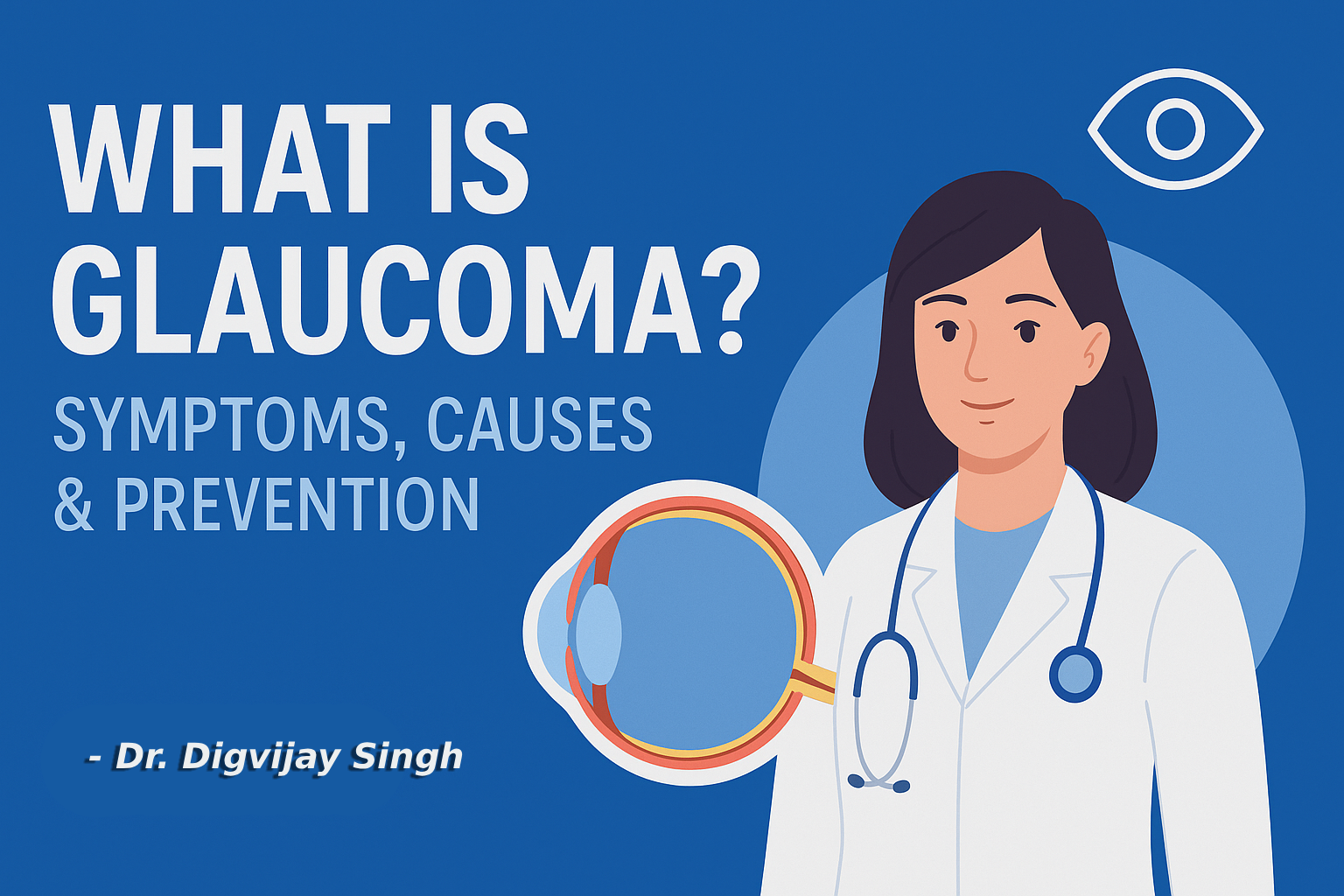
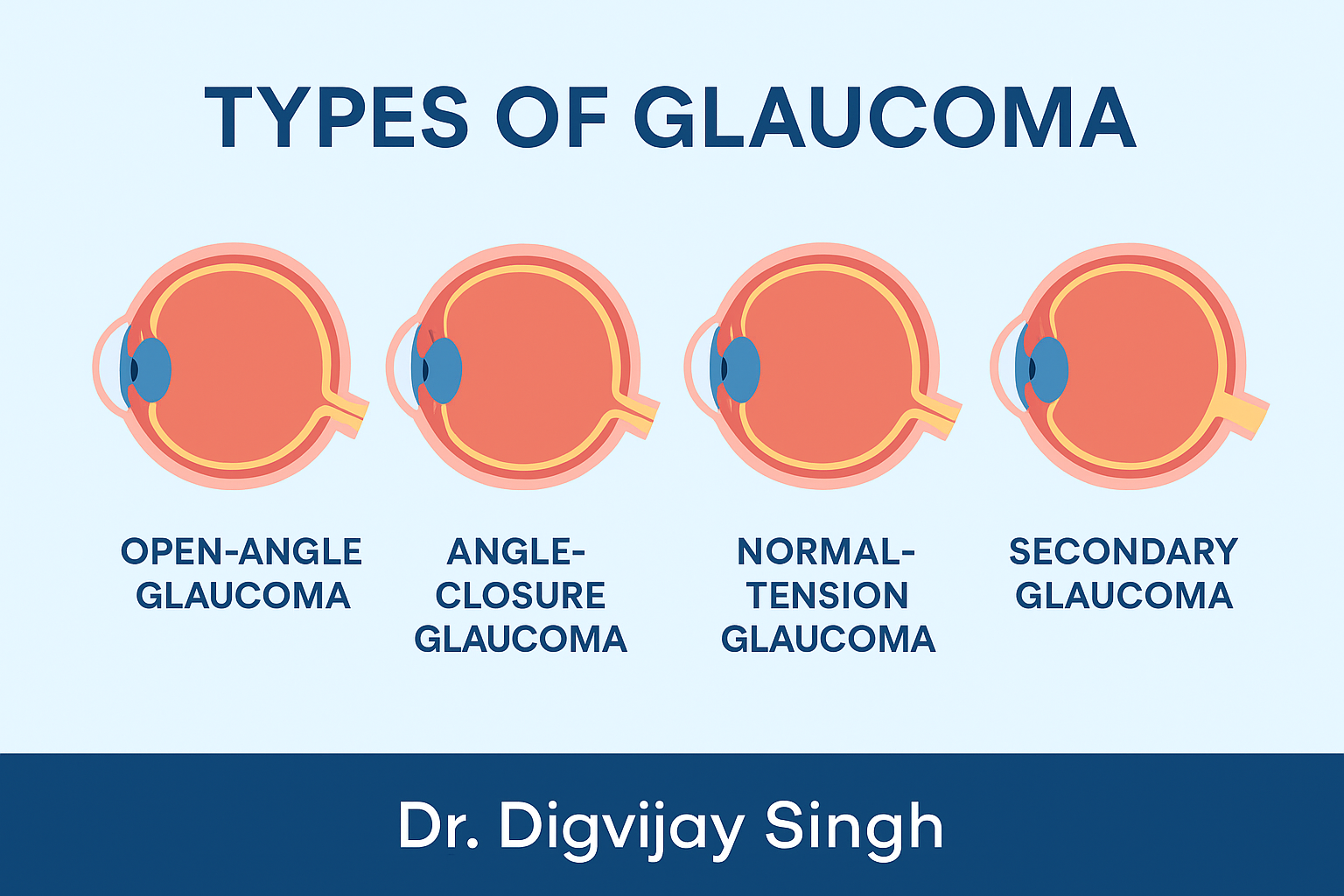
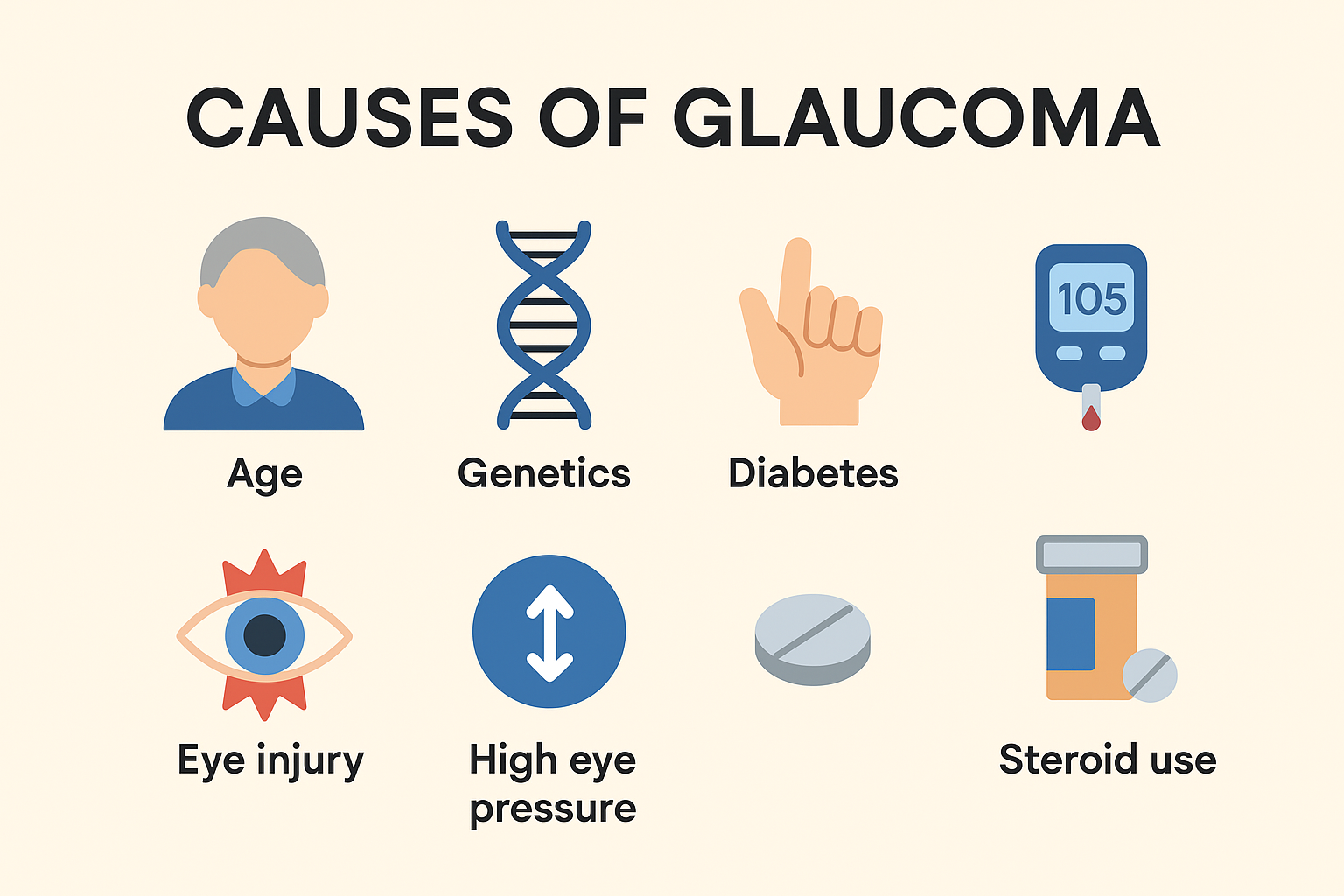
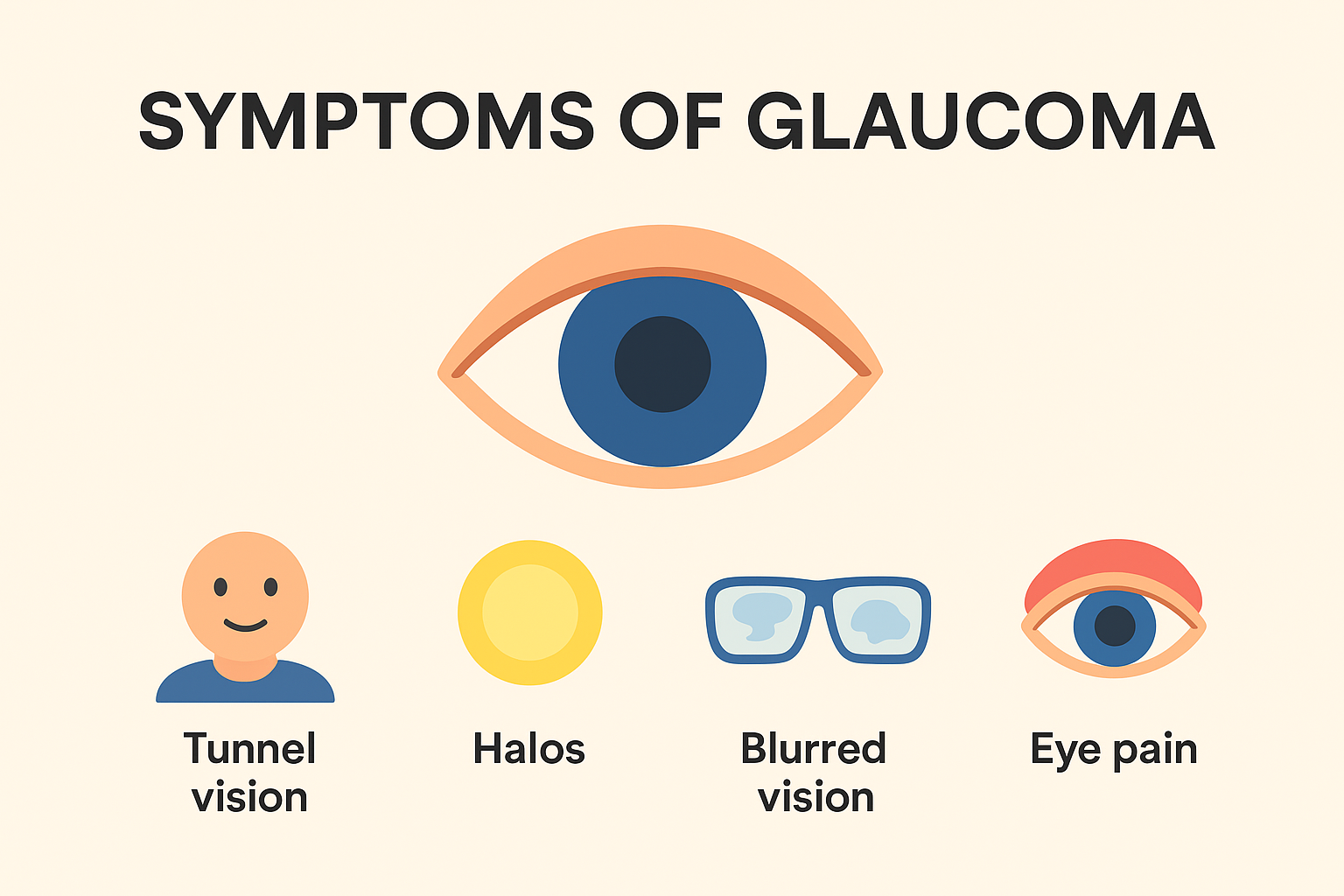
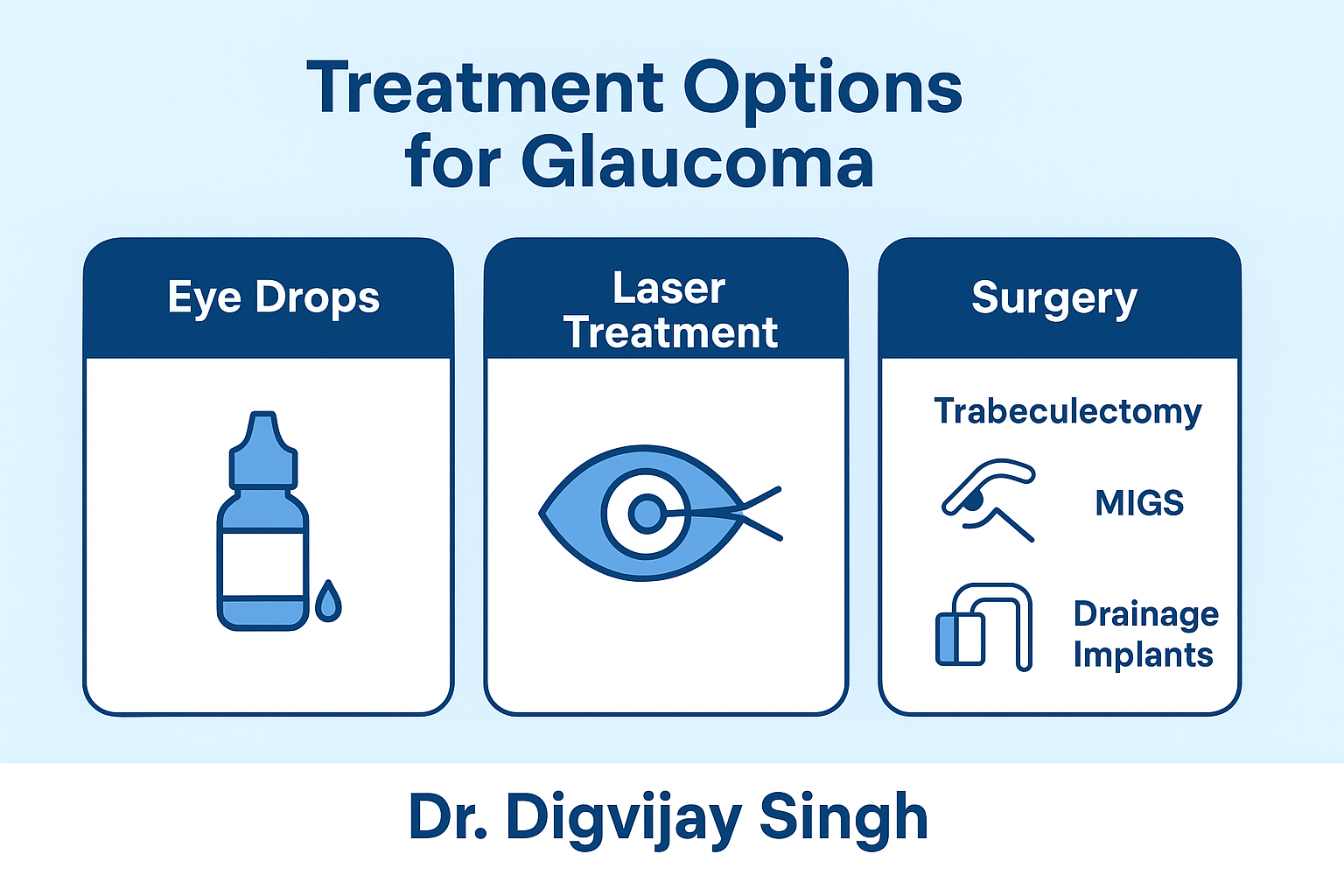
![DigvijayProfile[1]](https://drdigvijaysingh.com/wp-content/uploads/2017/11/DigvijayProfile1.jpg)
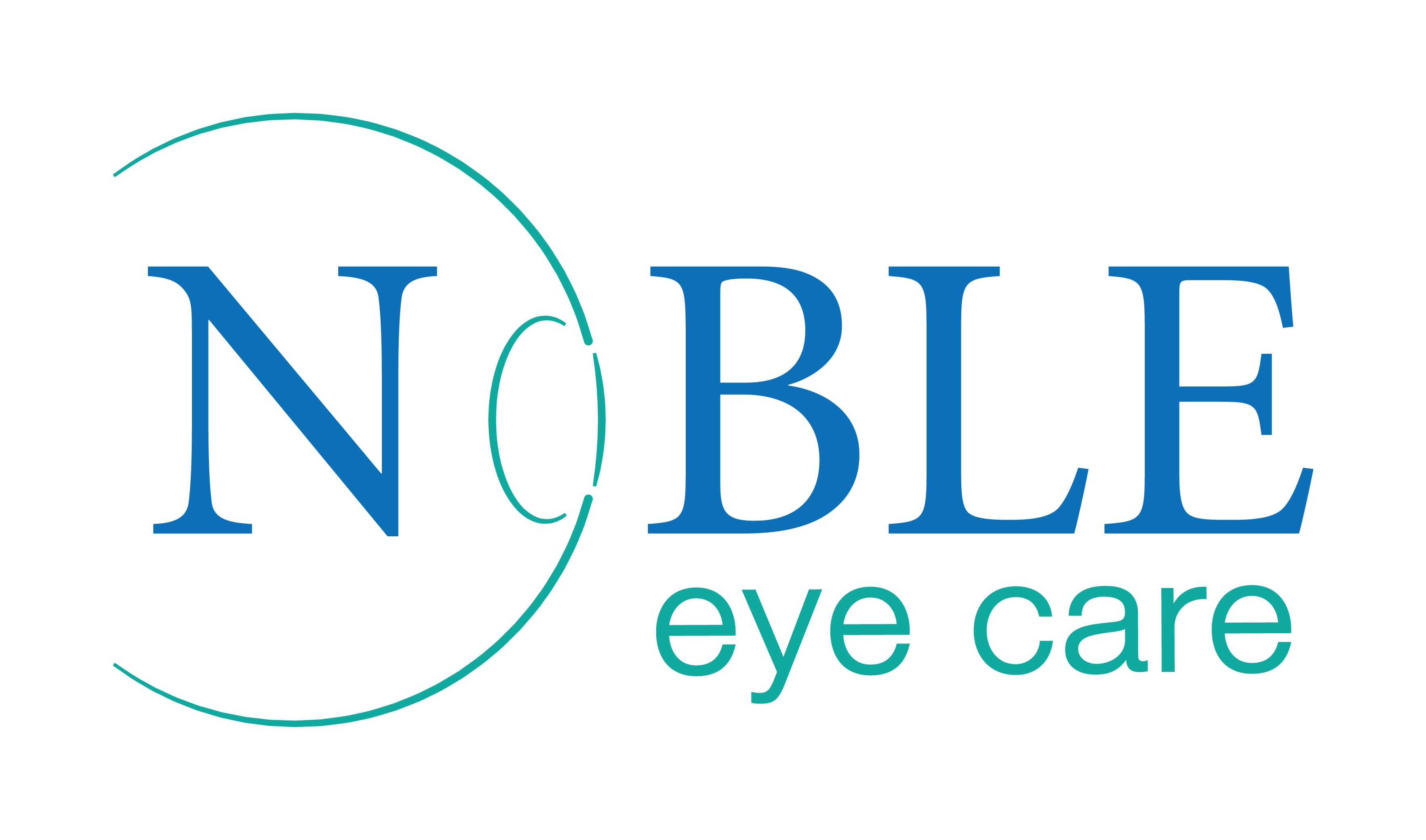
Recent Comments